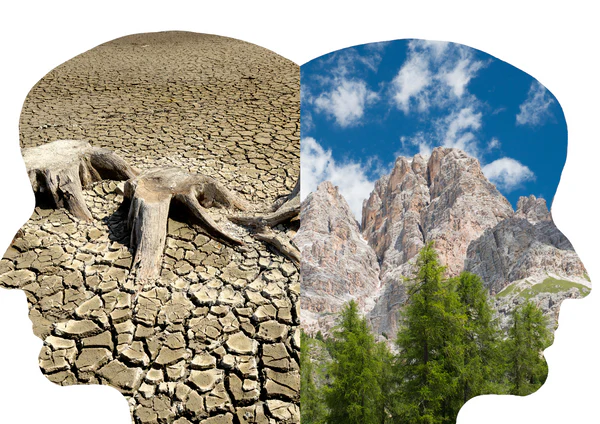As the world grapples with the wide-reaching impacts of climate change, new research is uncovering an unsettling connection: climate change is affecting our brain health. Beyond rising sea levels and melting ice caps, extreme temperatures, air pollution, and increased stress from natural disasters are taking a toll on our mental and cognitive well-being. Recent studies reveal that our brains may be more vulnerable to these environmental shifts than we once thought. In this blog, we’ll explore the latest findings on how climate change is reshaping the way our brains function—and what we can do to protect ourselves.
Heat Waves Are Melting More than Ice—They’re Hitting Our Brains

Extreme heat is becoming the new normal, but did you know it’s also cooking our brains? Studies show that when we’re exposed to high temperatures, our ability to think clearly, make decisions, and remember things takes a hit. People in hot climates or heat waves tend to perform worse on cognitive tasks and are more prone to confusion and fatigue. This is especially dangerous for the elderly, who already face higher risks of cognitive decline.
Air Pollution Is a Silent Brain Killer
We already know that pollution is bad for our lungs, but it’s even worse for our brains. Tiny particles from air pollution (like PM2.5) can enter the brain, causing inflammation and speeding up the aging process. Recent research links long-term pollution exposure to Alzheimer’s, Parkinson’s, and other neurodegenerative diseases. Breathing dirty air isn’t just an annoyance—it’s a brain health crisis in the making.
Climate Anxiety Is Real—and It’s Growing
The psychological effects of climate change are also starting to show. Climate disasters like hurricanes and wildfires are pushing more people into anxiety, depression, and even PTSD. But it’s not just the immediate effects; young people are experiencing “eco-anxiety,” a growing fear about the planet’s future. Feeling anxious about the fate of the world is becoming a normal part of life for millions, affecting mental health in profound ways.
Inequality Makes Brain Health Worse
Here’s another reality: not everyone is affected equally. Low-income communities and marginalized groups often live in the most polluted areas, with fewer resources to combat the effects of extreme weather. These populations are hit harder by heat and pollution, compounding the risks to their brain health. Climate change is turning into a public health issue that disproportionately affects those with the least ability to respond.
Cutting-Edge Research Is Sounding the Alarm
Scientists are diving deep into how climate change affects our brains, and the findings are alarming. From heat-induced cognitive decline to pollution-linked brain diseases, new studies are showing that the neurological impacts are real and increasing. Long-term research is just beginning, but the trends are clear: climate change is altering more than the environment—it’s changing us.
How to Protect Your Brain in a Changing Climate

We can’t stop climate change overnight, but there are steps we can take to protect ourselves. Investing in air purifiers, staying hydrated, and finding ways to stay cool during heatwaves are small but effective measures. On a broader scale, supporting policies that cut pollution and help communities adapt to climate risks will be crucial for protecting mental and neurological health.
While the effects of climate change on brain health are concerning, there are proactive steps you can take to protect yourself. From minimizing exposure to harmful environmental factors to prioritizing mental health, here’s how you can safeguard your cognitive well-being in a changing world:
- Stay Cool During Heatwaves: Prolonged heat exposure can impair cognitive function, so it’s essential to stay cool. Use air conditioning when available, stay hydrated, and limit outdoor activities during peak heat. Cooling centers are a valuable resource in high-temperature areas.
- Monitor Air Quality: Air pollution is a known contributor to cognitive decline and neurodegenerative diseases. Use air quality apps or websites like AirNow to stay informed about local conditions. On high pollution days, limit outdoor activities, close windows, and use air purifiers indoors to reduce exposure.
- Focus on a Brain-Healthy Diet: Eating a nutrient-rich diet with antioxidants can help protect brain cells from environmental damage. Omega-3 fatty acids, found in fish, nuts, and seeds, are known to support brain health. Additionally, a Mediterranean diet, rich in vegetables, fruits, whole grains, and healthy fats, has been linked to reduced cognitive decline.
- Practice Stress-Relief Techniques: The mental health toll of climate change-related anxiety, stress, and trauma is real. Managing stress through mindfulness, meditation, exercise, and connecting with supportive communities can help protect your mental health. Counseling and therapy can also offer critical support for those experiencing climate-related psychological distress.
Protecting Your Brain’s Health Starts Here – We’re Ready to Help
At The Growth Shark, we’re passionate about amplifying voices and driving positive change on critical issues like climate change and mental health. If you’re a brand dedicated to environmental advocacy or mental well-being, partner with us to create impactful, data-driven campaigns that resonate and drive action. Together, let’s raise awareness, influence policy, and make a difference in safeguarding our planet and our minds.
Connect with us to discover how our cause-driven marketing fuels growth and builds a brighter future.









